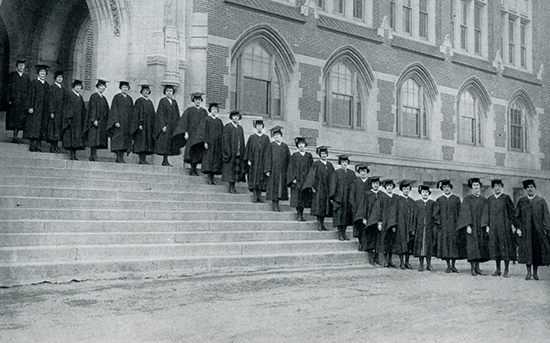Emmanuel College has always been a place grounded in strong values and beliefs, yet unafraid to challenge its community and the world around it.
In 1919, the Sisters of Notre Dame de Namur, an international Catholic religious congregation, opened Emmanuel as the first Catholic college for women in New England. Deeply committed to education, the Sisters founded the College to provide women with educational opportunities they might not have had otherwise.
For more than 80 years, Emmanuel served proudly as a Catholic liberal arts and sciences college for women and enjoyed a reputation for academic rigor and a commitment to social justice. In 2001, the College officially became a coeducational institution, expanding its educational mission to include young men in its undergraduate arts and sciences program. Now in its second century, the College is a thriving, future-focused institution, still deeply committed to the tenets of its founding.

Historic Highlights
In the early years, Emmanuel was a day college preparing women for professional fields such as business, law, medicine and social work. Despite being commuters, students were involved in numerous co-curricular activities including student publications and athletics. The 1920s, 1930s and 1940s saw growth not only in the student population, academic programs and activities, but also in the physical campus, with additional land purchases on Brookline Avenue and Avenue Louis Pasteur. In 1949, the College completed the construction of Alumnae Hall. This science center, the first building constructed on campus after the original Administration Building (now the Eisner Administration Building) signified Emmanuel's strength in the sciences, which continues today.
During the building boom of the 1950s and 1960s, Emmanuel became a residential college. New buildings included Marian Hall (residential, dining and student center), St. James Hall, Julie Hall, St. Ann Hall, Loretto Hall and St. Joseph Hall. The Cardinal Cushing Library was also dedicated in 1965. By 1968, residential students outnumbered commuters for the first time.
Over the years, the College has responded to shifting demographics in higher education and the world at large with an innovative and entrepreneurial spirit. In the 1970s, Emmanuel began to offer degree completion programs to adult learners and, in 1990, the College expanded its programs to include flexible accelerated formats, with programs in business and nursing offered at satellite centers.
The 2000s saw dramatic growth and innovation, with enrollment tripling in the decade following the College's decision to become coeducational. During this period the College added new facilities including the Jean Yawkey Center (student center) and the Maureen Murphy Wilkens Science Center. In 2009, the College partnered with the City of Boston to restore Roberto Clemente Field, across the street from campus, to serve as Emmanuel's home athletic field. In 2013, Emmanuel completed the restoration of the historic Eisner Administration Building. In 2018, the College opened its newest and largest building, Saint Julie Hall, an 18-story, apartment-style residence for upper-class students, on the original site of Julie Hall.
And in 2019, the College marked its Centennial with celebrations that reflected on 100 years of transformative educational experiences and the bold, entrepreneurial spirit that enabled the College to thrive amid changes in society and in higher education. A significant development in the second century is the addition of a traditional undergraduate nursing program and the formal opening of the Maureen Murphy Wilkens School of Nursing & Clinical Sciences in 2021.
Amid changes, Emmanuel has remained steadfastly committed to its Catholic educational mission and its core values, which emphasize intellectual inquiry and integrity, a commitment to justice and peace, a strong sense of community, and service to others.


